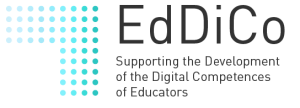A New Approach to Digital Competence Building for University Educators in Europe
Since the mid 1990’s, the exponentially growing adoption of digital information and communication technologies (ICTs) in everyday life has resulted in new social dynamics and reconfigured opportunities for access to expertise and knowledge transfer. This has important implications for teaching and learning processes, for example through participatory cultures and open educational practices. The potential benefits of this include opportunities for informal and peer-to-peer learning, a new attitude toward intellectual property, diversification of cultural expression, a better dialogue around skills valued in the workplace, and a more proactive conception of citizenship.
However, to fully enjoy these benefits, a number of challenges need to be overcome, including unequal opportunities for participation, low media literacy and ethical issues (Jenkins et al., 2015). To address these challenges, it is essential to carefully reconsider the knowledge, skills and attitudes that must be at the core of contemporary learning experiences and, based on that, expand the key attributes that educators should possess in order to meaningfully support learners – across all age groups – in becoming competent professionals and engaged citizens in a networked world.
Therefore, it is crucial for institutions and governments to understand how to better design professional development opportunities and capacity building programmes for academics at various career stages. A number of generic frameworks redefining the idea of literacy in a digital world have emerged over the last few years out of different disciplines, schools of thought and professional sectors (Ala-Mukta, 2011). As a consequence, the range of competences, levels of proficiency, scope and terminology is extremely varied. More specifically, some proposals have attempted to identify the attributes and qualities that are particularly relevant to academics at various levels (Redecker, 2017; UNESCO, 2011). Ultimately what is at stake is the (re)definition of what it means to be an educator in the context of contemporary educational institutions, what students need to learn and how they can best learn in contemporary networked societies.
| Provided By | Fabio Nascimbeni, Universidad Internacional de la Rioja (UNIR), Spain; Daniel Villar-Onrubia, Katherine Wimpenny, Coventry University, United Kingdom; Daniel Burgos, Universidad Internacional de la Rioja (UNIR), Spain. EDEN, European Distance and E-Learning Network, Conference Proceedings. |
| Type of provider | European project |
| Provided at | https://www.eden-online.org/proc-2485/index.php/PROC/article/view/1616/1324 |
| Learning opportunity type | OER |
| Language | en |
| Home page | https://www.eden-online.org/proc-2485/index.php/PROC/article/view/1616/1324 |
| Admission procedure | Open to all |
| Price details | For free |
| Type of credential | Open Badge |

